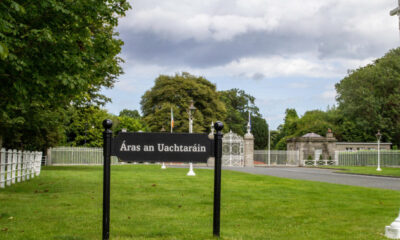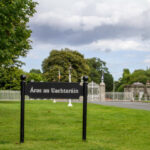Breaking News
Tánaiste discusses Irish-US economic ties in Washington
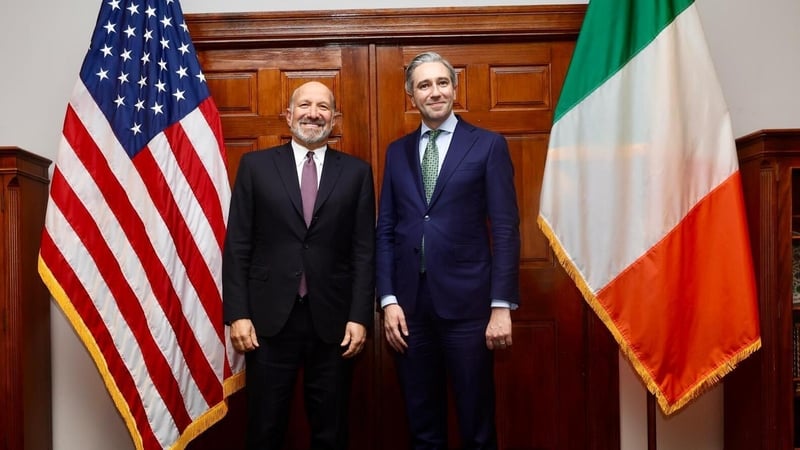
This post was originally published on this site.
Tánaiste Simon Harris has met with US Secretary of Commerce Howard Lutnick in Washington DC.
The meeting at the Department of Commerce was an opportunity to discuss the dynamic economic, trade and investment relationship between Ireland and the US.
It was also a chance to take stock on the implementation of the EU-US Framework on an Agreement on Reciprocal, Fair and Balanced Trade agreed in July.
They discussed the potential of expanding the list of goods that are exempt from the baseline 15% tariff rate.
Ireland has a particular interest in this as it relates to the spirits and med-tech sectors. They also discussed the issue of non-tariff barriers as well as the ongoing Section 232 investigations on pharmaceuticals and semiconductors.
They exchanged views on the impact of the expansion of the Section 232 measures on certain steel and aluminium given the impact of these on a number of Irish manufacturers, particularly in the agri-tech sector.

Mr Harris raised the recent proposal by the US to raise the cost of H1B visas applications, and noted the importance of pathways for high-skilled workers, innovators and job creators to live and work in the US.
More broadly the meeting was an opportunity to discuss the mutually beneficial economic relationship between Ireland and the US, and how it can be protected and deepened in the time ahead.
The Tánaiste took the opportunity to update Mr Lutnick on the economic impact report: Ireland and the USA: a shared economic story – which he launched.
The report shows the impact of Irish companies investing across all 50 states.
Breaking News
Danish airport closes again after reported drone sighting
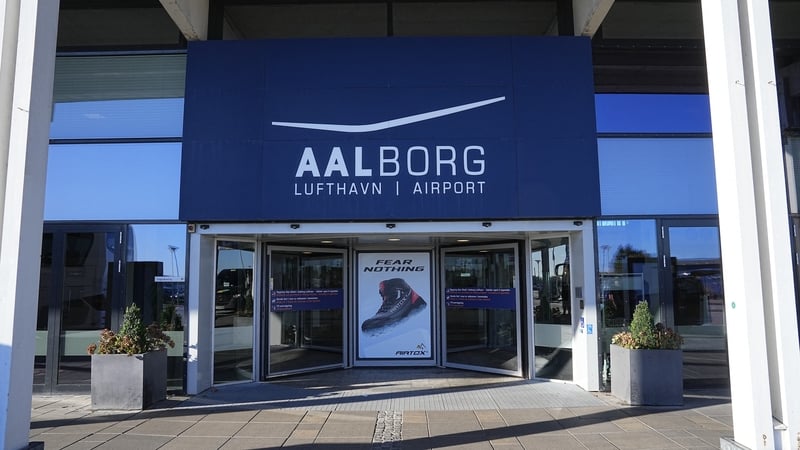
Read more on post.
A suspected drone sighting briefly shuttered a Danish airport this morning for the second time in a few hours, after the country’s prime minister said the flights were part of “hybrid attacks” that may be linked to Russia.
Drones have been seen flying over several Danish airports since Wednesday, causing one of them to close for hours, after a sighting earlier this week prompted Copenhagen airport to shut down.
That followed a similar incident in Norway, drone incursions in Polish and Romanian territory and the violation of Estonian airspace by Russian fighter jets, which raised tensions in light of Russia’s ongoing invasion of Ukraine.
“Over recent days, Denmark has been the victim of hybrid attacks,” Prime Minister Mette Frederiksen said yesterday in a video message on social media – referring to a form of unconventional warfare.
She warned that such drone flights “could multiply”.
Investigators said they had so far failed to identify those responsible, but Ms Frederiksen stressed: “There is one main country that poses a threat to Europe’s security, and it is Russia.”
Moscow said yesterday that it “firmly rejects” any suggestion that it was involved in the Danish incidents. Its embassy in Copenhagen called them “a staged provocation”, in a post on social media.
Denmark’s Justice Minister Peter Hummelgaard earlier said the aim of the attack was “to spread fear, create division and frighten us”.
He added that Copenhagen would acquire new enhanced capabilities to “detect” and “neutralise drones”.
Denmark will later today join other EU countries, mostly along the eastern border with Russia, in the first talks on proposals to build a “wall” of anti-drone defences in the face of the tensions with Moscow.
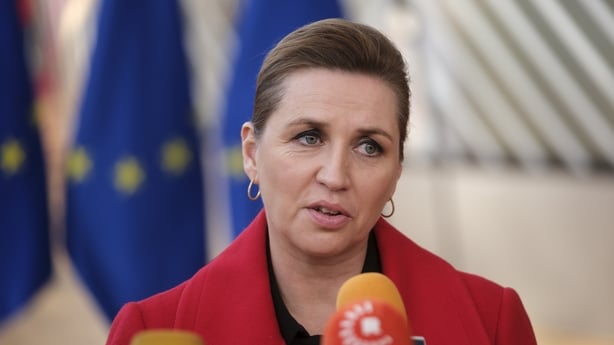
Drones have been seen flying over several Danish airports since Wednesday, causing one of them to close for hours, after a sighting earlier this week prompted Copenhagen airport to shut down.
That followed a similar incident in Norway, drone incursions in Polish and Romanian territory and the violation of Estonian airspace by Russian fighter jets, which raised tensions in light of Russia’s ongoing invasion of Ukraine.
“Over recent days, Denmark has been the victim of hybrid attacks,” Prime Minister Mette Frederiksen said yesterday in a video message on social media – referring to a form of unconventional warfare.
She warned that such drone flights “could multiply”.
Investigators said they had so far failed to identify those responsible, but Ms Frederiksen stressed: “There is one main country that poses a threat to Europe’s security, and it is Russia.”
Moscow said yesterday that it “firmly rejects” any suggestion that it was involved in the Danish incidents. Its embassy in Copenhagen called them “a staged provocation”, in a post on social media.
Denmark’s Justice Minister Peter Hummelgaard earlier said the aim of the attack was “to spread fear, create division and frighten us”.
He added that Copenhagen would acquire new enhanced capabilities to “detect” and “neutralise drones”.
Denmark will later today join other EU countries, mostly along the eastern border with Russia, in the first talks on proposals to build a “wall” of anti-drone defences in the face of the tensions with Moscow.
Russia sabotage warning
Drones were spotted on Wednesday and early yesterday morning at airports in Aalborg, Esbjerg, Sonderborg and at the Skrydstrup air base before leaving on their own, police said.
Aalborg airport, located in northern Denmark, was initially shut down for several hours, and closed again for about an hour from late last night into early this morning due to another suspected sighting.
“It was not possible to take down the drones, which flew over a very large area over a couple of hours,” North Jutland chief police inspector Jesper Bojgaard Madsen said about the initial Aalborg incident.
The head of Denmark’s military intelligence, Thomas Ahrenkiel, told a news conference the service had not been able to identify who was behind the drones.
But intelligence chief Finn Borch said: “The risk of Russian sabotage in Denmark is high.”
Danish Defence Minister Troels Lund Poulsen told a news conference the flights appeared to be “the work of a professional actor… such a systematic operation in so many locations at virtually the same time”.
He said it had posed “no direct military threat” to Denmark.
Ms Frederiksen said Thursday that she had spoken with NATO chief Mark Rutte about the incidents.
Lund Poulsen said the government had yet to decide whether to invoke NATO’s Article 4, under which any member state can call urgent talks when it feels its “territorial integrity, political independence or security” are at risk.
French President Emmanuel Macron said his country stood ready “to contribute to the security of Danish airspace”.
Copenhagen is set to host a summit of European Union leaders next week.
Breaking News
School scanners for pupils thought to have weapons

Read more on post.
Anna LewisBBC Wales
Handheld scanners will be used to search children suspected of having a weapon in Cardiff schools under new guidance.
The guidelines, which are thought to be the first of their kind in Wales, deal with what happens when a child is thought to be carrying a weapon, and the next steps if one is found.
Cardiff council said it had been designed after calls by head teachers for up-to-date advice to keep students and staff safe, following growing concerns about knife crime in schools.
Sarah Merry, the council’s cabinet member for education, said while she understood parents “may feel anxious about the idea of searches”, they would not be part of a daily school routine or “done lightly”.
In 2013, the Welsh government introduced a power which allowed schools in Wales to screen pupils for a knife or other weapons, and to search pupils suspected of carrying a weapon.
New guidance sent to parents in Cardiff states a search may be necessary if staff have a “reasonable” suspicion that a young person has a weapon in school.
During a search, it added two members of staff would be present, and that in most cases a “search wand” would be used to remove any physical contact.
“Parents or carers will be informed following a search and the reasons for the search will be explained,” the guidance adds, with the purpose of the search also explained to the student.
Under the guidelines, if a weapon is found then an incident review meeting should be arranged within five school days of the incident with “at least one daily welfare check”.
The young person should not be allowed to go to school until this meeting has taken place, while a “trauma-informed investigation” would then take place to understand why the young people brought the weapon into school and the next steps that should be taken.
According to Cardiff council, the guidelines recognise “there are often complex reasons why a young person might carry a weapon” and encourages schools to work with families and other services so support can be put in place.
The guidelines have been rolled out to all primary, secondary and special schools after being developed through consultation with children, and co-produced with partners including South Wales Police, youth services and violence prevention experts.
Merry, who is also council deputy leader, said: “Head teachers have been asking for revised support in this area and it’s absolutely right that we’ve worked closely with them to create something practical and useful.
“It is also part of our review following incidents in other parts of the country and gives schools the tools they need to keep everyone safe – it’s not about creating fear; it’s about building confidence.”
As well as guidance on weapons, each school in Cardiff has appointed a violence prevention lead, who are senior staff members that will take part in specialist training to prepare them for real-life situations involving weapons or threats to safety.
Other actions taken to keep schools safe include lockdown rehearsals to help schools prepare for emergencies, and using the curriculum to “build a culture of respect and safety”.
Breaking News
Police hear more than 70 complaints in missing ashes probe

Read more on post.
Police have received reports from more than 70 people regarding the practices of a funeral directors as they continue their investigation into missing ashes.
Operation Koine was launched in April last year following reports relating to the former A Milne Independent Funeral Directors in the Glasgow and Dumbarton areas.
Police said they were working through “hundreds of lines of inquiry” as part of the investigation into alleged mishandling of cremated remains and alleged fraud. In some cases, families discovered they had been given the wrong ashes.
Two women, aged 37 and 55, and a 56-year-old man were arrested in connection with the inquiry and released pending further inquiries.
Police have confirmed that 18 lots of ashes were recovered as part of their investigation. Five are yet to be identified.
They said they had received reports from more than 70 people but believed a larger number may be affected.
They have urged anyone in that position to contact them and said they would be investigating every report.
Det Supt Robert Bowie said: “This is an unprecedented investigation for Police Scotland and one of the largest ongoing financial inquiries.
“I want to reassure the public. We have a dedicated team working through hundreds of lines of inquiry. Although the work we’re doing may not be visible, we are committed to fully investigating.
“I’m appealing to anyone with concerns regarding the handling of cremated remains or pre-paid funeral plans with this former funeral directors to come forward.”
Mr Bowie said the “vast majority” of complaints related to alleged fraudulent prepaid funeral plans.
He added that most cremated remains recovered from previous A Milne premises had been returned to families or dealt with according to families’ wishes but added that there is a “small amount” left unclaimed.
“As it stands, there is still a small amount of cremated remains which remain unclaimed and unidentified, and that’s what we’re looking to achieve through traditional lines of inquiry,” he said.
Specialist officers, including those from the Financial Investigations Unit, are involved in the investigation.
Jackie Barnes, 58, from Dumbarton, is one of the people affected.
She scattered the ashes she believed were her mother’s alongside her father’s in January 2024.
But months later she was contacted to say her mother’s ashes were found during a police search at the company’s Springburn branch.
Ms Barnes’ husband Danny had died in December 2020, the year before her mother.
She now has concerns over the authenticity of his ashes.
She told BBC Scotland News: “I just want to put this to rest. It’s been a lot.”
She said she did not know for sure if her husband’s ashes were the correct ones but eventually decided to have them scattered with those of her son, who died a number of years previously.
“Every night I’d look at my husband [the urn] and say ‘Are you my husband?’ It does play on your mind. I just thought I need to put them in with my son, whether it was Danny or not.
“They can’t do DNA with ashes so I just have to put it out of my head. But it’s hard, thinking is it him? Is it not him?
“I thought they’d given me my mum back but they gave me someone we will never know – some family will never know who I’ve scattered.
“They don’t know the devastation they’ve caused people.”
She added: “I want to see justice and for them to own up to what they’ve done to people and how much hurt they’ve caused, not only financially but physically and emotionally.
“They’ve got to apologise to everyone they’ve hurt but I don’t think they will.”
Ms Barnes says she ended up having seven months of counselling and could not have managed without the support of her close friend of 30 years Liz Ruine, 72, who lost money after paying into a funeral plan with the same company.
She had paid more than £3,100 but received nothing back when she was told they were no longer in business.
“I’ve accepted I won’t get the money back,” she said. “Sometimes I have a bit of guilt about the money because I’ve not lost a relative or anything.
“I just hope I’ve helped people I’ve spoken to. Hearing their stories has been really harrowing.
“When the stuff about the ashes came out it just became unbelievable. Then you think ‘nobody would do that’
“It’s hard to believe they could do that to people when they’re at their most vulnerable?
“Families might not even know that their elderly parents had taken out plans.
“It’s just devastating for everybody.”
Kate Wallace, chief executive of Victim Support Scotland, said: “Finding out that your loved one may not have been cared for in the way they would have wanted following their death is extremely upsetting and shocking.
“This, combined with the added possibility of fraud in relation to funeral plans, further adds to an already distressing and traumatic time.
“We have been closely monitoring developments and related investigations in England and Wales for some time, and remain committed to ensuring that victims of this crime are able to access the support services available to them.”
Victim Support Scotland said it was working closely with Police Scotland to explore a package of support for people affected.
Its helpline is available on 0800 160 1985, with a webchat service also on offer.
Anyone with information can email police at www.operationkoinescotland.police.uk.
-
Culture3 days ago
Taylor Swift’s new cinema outing generates more than €12million in just 24 hours
-
Politics3 days ago
European Parliament snubs Orbán with vote to shield Italian MEP from Hungarian arrest
-
Health4 days ago
EU renews support for WHO’s Universal Health Coverage Partnership
-
Culture3 weeks ago
Life, loss, fame & family – the IFI Documentary Festival in focus
-
Environment6 days ago
Key oceans treaty crosses threshold to come into force
-
Culture3 days ago
Twilight at 20: the many afterlives of Stephenie Meyer’s vampires
-
Culture2 months ago
Fatal, flashy and indecent – the movies of Adrian Lyne revisited
-
Culture1 week ago
Farewell, Sundance – how Robert Redford changed cinema forever


